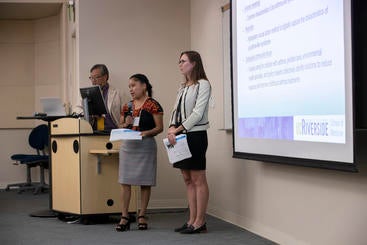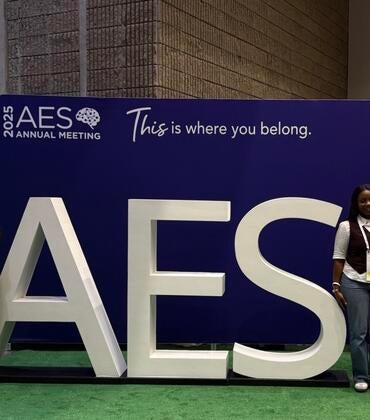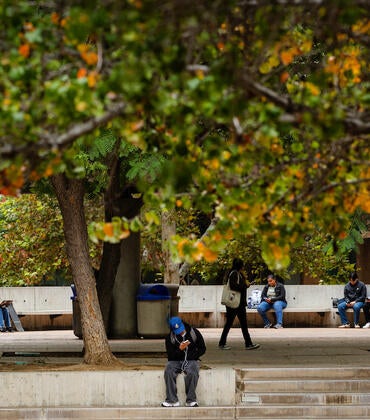The Center for Health Disparities Research at UC Riverside held its inaugural symposium on Feb. 20 at UCR Palm Desert. Approximately 70 researchers and community members attended the event.
Also referred to as HDR@UCR, the center was founded in August 2019 and is funded by a grant of $16 million from the National Institutes of Health’s National Institute on Minority Health and Health Disparities.
“This center brings together investigators from multiple disciplines to address issues of health disparities,” said Dr. Deborah Deas, the Mark and Pam Rubin Dean of the UCR School of Medicine and chief executive officer of clinical affairs. “It is apropos that we have the inaugural symposium here in the Coachella Valley. Two of our key projects are being done in this region: how the feeding practices of infants relates to obesity and childhood growth; and the impact of aerosolized particulates on health.”
Deas thanked Dr. David Lo and Juliet McMullin, the center’s co-directors, for their leadership and stressed that HDR@UCR is a resource for the community that relies on a collective approach to its work.
“Health disparities are challenging, and so is the work required to address them,” she said. “The center has awarded many grants to researchers. We are excited about the contributions these researchers will make to the community.”
Guadalupe Ayala, a professor of public health at San Diego State University gave the keynote presentation, titled “Promoting Health in Partnership with a Federally Qualified Health Center: Our Journey,” in which she described the steps San Diego State took to prevent and control childhood asthma.
The keynote speech was followed by presentations on the two HDR@UCR projects being conducted in the Coachella Valley.
Ann Cheney and Tanya Nieri, who work with families enrolled in Early Head Start in Southern California, shared some alarming statistics on obesity: Childhood obesity has doubled since the 1970s; 18.5% of children nationwide suffer from obesity; 15%-19% of children suffer from obesity in California; 40% of children in Riverside, San Bernardino, and Imperial counties are obese.
“Obesity and disparities start early in life,” Cheney said. “Childhood obesity is complex. Feeding practices and feeding styles in early life are big factors. We are learning about these factors from mothers, their infant children, and trusted other caregivers.”
“Intervening in preschool and elementary school is too late,” Nieri said. “Family and trusted other caregivers are critical to obesity prevention. It is easier to prevent than intervene.”
Lo discussed the cross-disciplinary project aimed at assessing the impact of aerosolized particulates on health, in particular, childhood asthma among Latino populations near the Salton Sea.
“In eastern Coachella Valley and Imperial County, childhood asthma incidence is three times or more than the rest of California,” he said. “We know that dust is thought to be associated with asthma in the Salton Sea region. But in mouse studies the exposure to this dust shows a new gene fingerprint that is different from allergic inflammation. Is there then a distinct asthma-like syndrome at the Salton Sea? We would like to know.”
Maria Pozar, a community organizer at the Salton Sea, discussed what she and Cheney have heard from community members in the region.
“We often hear them say, ‘The sea gives asthma to children; it has infected them,’” Pozar said.
Pozar and Cheney have already collected data from more than 100 caregivers of children with asthma or respiratory distress. They said the top health priorities in the eastern Coachella Valley are child health, mental health, substance abuse.
“We have established a community advisory board and will be doing in-home meetings, a photovoice project, and deliberative community forums,” Cheney said.
The symposium, which will be held annually, continued with brief talks given by some of the researchers who received HDR@UCR grants, followed by a discussion of the center’s future goals.




